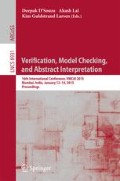Abstract
We present a new abstract interpretation based approach for automatically verifying concurrent programs running on relaxed memory models.
Our approach is based on three key insights: i behaviors of relaxed models (e.g. TSO and PSO) are naturally captured using explicit encodings of store buffers. Directly using such encodings for program analysis is challenging due to shift operations on buffer contents that result in significant loss of analysis precision. We present a new abstraction of the memory model that eliminates expensive shifting of store buffer contents and significantly improves the precision and scalability of program analysis, ii an encoding of store buffer sizes that leverages knowledge of the abstract interpretation domain, further improving analysis precision, and iii a source-to-source transformation that realizes the above two techniques: given a program P and a relaxed memory model M, it produces a new program P M where the behaviors of P running on M are over-approximated by the behavior of P M running on sequential consistency (SC). This step makes it possible to directly use state-of-the-art analyzers under SC.
We implemented our approach and evaluated it on a set of finite and infinite-state concurrent algorithms under two memory models: Intel’s x86 TSO and PSO. Experimental results indicate that our technique achieves better precision and efficiency than prior work: we can automatically verify algorithms with fewer fences, faster and with lower memory consumption.
Access this chapter
Tax calculation will be finalised at checkout
Purchases are for personal use only
Preview
Unable to display preview. Download preview PDF.
References
Abdulla, P.A., Atig, M.F., Chen, Y.-F., Leonardsson, C., Rezine, A.: Automatic fence insertion in integer programs via predicate abstraction. In: Miné, A., Schmidt, D. (eds.) SAS 2012. LNCS, vol. 7460, pp. 164–180. Springer, Heidelberg (2012)
Alglave, J., Kroening, D., Nimal, V., Poetzl, D.: Don’t sit on the fence - a static analysis approach to automatic fence insertion. In: Biere, A., Bloem, R. (eds.) CAV 2014. LNCS, vol. 8559, pp. 508–524. Springer, Heidelberg (2014)
Alglave, J., Kroening, D., Nimal, V., Tautschnig, M.: Software verification for weak memory via program transformation. In: Felleisen, M., Gardner, P. (eds.) ESOP 2013. LNCS, vol. 7792, pp. 512–532. Springer, Heidelberg (2013)
Atig, M.F., Bouajjani, A., Parlato, G.: Getting rid of store-buffers in TSO analysis. In: Gopalakrishnan, G., Qadeer, S. (eds.) CAV 2011. LNCS, vol. 6806, pp. 99–115. Springer, Heidelberg (2011)
Bouajjani, A., Derevenetc, E., Meyer, R.: Checking and enforcing robustness against TSO. In: Felleisen, M., Gardner, P. (eds.) ESOP 2013. LNCS, vol. 7792, pp. 533–553. Springer, Heidelberg (2013)
Burckhardt, S., Musuvathi, M.: Effective program verification for relaxed memory models. In: Gupta, A., Malik, S. (eds.) CAV 2008. LNCS, vol. 5123, pp. 107–120. Springer, Heidelberg (2008)
Burnim, J., Sen, K., Stergiou, C.: Testing concurrent programs on relaxed memory models. In: ISSTA 2011 (2011)
Cousot, P., Cousot, R.: Abstract interpretation: A unified lattice model for static analysis of programs by construction of approximation of fixed points. In: POPL 1977 (1977)
Cousot, P., Halbwachs, N.: Automatic discovery of linear restraints among variables of a program. In: POPL 1978 (1978)
Dan, A.M., Meshman, Y., Vechev, M., Yahav, E.: Predicate abstraction for relaxed memory models. In: Logozzo, F., Fähndrich, M. (eds.) SAS 2013. LNCS, vol. 7935, pp. 84–104. Springer, Heidelberg (2013)
de Moura, L., Bjørner, N.S.: Z3: An efficient SMT solver. In: Ramakrishnan, C.R., Rehof, J. (eds.) TACAS 2008. LNCS, vol. 4963, pp. 337–340. Springer, Heidelberg (2008)
Jeannet, B.: Relational interprocedural verification of concurrent programs. Software and System Modeling 12(2), 285–306 (2013)
Jeannet, B., Miné, A.: Apron: A library of numerical abstract domains for static analysis. In: Bouajjani, A., Maler, O. (eds.) CAV 2009. LNCS, vol. 5643, pp. 661–667. Springer, Heidelberg (2009)
Kuperstein, M., Vechev, M., Yahav, E.: Automatic inference of memory fences. In: FMCAD 2010 (2010)
Kuperstein, M., Vechev, M., Yahav, E.: Partial-coherence abstractions for relaxed memory models. In: PLDI 2011 (2011)
Lamport, L.: How to make a multiprocessor computer that correctly executes multiprocess programs. IEEE Trans. Comput. 28(9), 690–691 (1979)
Linden, A., Wolper, P.: An automata-based symbolic approach for verifying programs on relaxed memory models. In: van de Pol, J., Weber, M. (eds.) SPIN 2010. LNCS, vol. 6349, pp. 212–226. Springer, Heidelberg (2010)
Meshman, Y., Dan, A., Vechev, M., Yahav, E.: Synthesis of memory fences via refinement propagation. In: Müller-Olm, M., Seidl, H. (eds.) SAS 2014. LNCS, vol. 8723, pp. 237–252. Springer, Heidelberg (2014)
Miné, A.: The octagon abstract domain. Higher Order Symbol. Comput. 19(1), 31–100 (2006)
Rival, X., Mauborgne, L.: The trace partitioning abstract domain. ACM Trans. Program. Lang. Syst. 29(5), 26 (2007)
Sevcík, J., Vafeiadis, V., Nardelli, F.Z., Jagannathan, S., Sewell, P.: Compcerttso: A verified compiler for relaxed-memory concurrency. J. ACM 60(3), 22 (2013)
Shasha, D., Snir, M.: Efficient and correct execution of parallel programs that share memory. ACM Trans. Program. Lang. Syst. 10(2), 282–312 (1988)
Sura, Z., Fang, X., Wong, C.-L., Midkiff, S.P., Lee, J., Padua, D.: Compiler techniques for high performance sequentially consistent java programs. In: PPoPP 2005 (2005)
Author information
Authors and Affiliations
Editor information
Editors and Affiliations
Rights and permissions
Copyright information
© 2015 Springer-Verlag Berlin Heidelberg
About this paper
Cite this paper
Dan, A., Meshman, Y., Vechev, M., Yahav, E. (2015). Effective Abstractions for Verification under Relaxed Memory Models. In: D’Souza, D., Lal, A., Larsen, K.G. (eds) Verification, Model Checking, and Abstract Interpretation. VMCAI 2015. Lecture Notes in Computer Science, vol 8931. Springer, Berlin, Heidelberg. https://doi.org/10.1007/978-3-662-46081-8_25
Download citation
DOI: https://doi.org/10.1007/978-3-662-46081-8_25
Publisher Name: Springer, Berlin, Heidelberg
Print ISBN: 978-3-662-46080-1
Online ISBN: 978-3-662-46081-8
eBook Packages: Computer ScienceComputer Science (R0)

